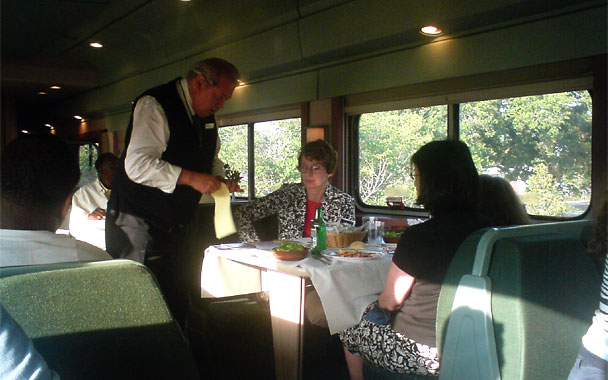I put on a Muhammad Ali-like display of the bob and weave to get through the rollicking train to the dining car, which I liked to think of as evidence of how much I deserved dinner. Evidently, all the other passengers also had cat-like reflexes, and so despite my skill and perseverance, I had to wait for a seat.
On my way out to the lounge car, I passed by the kitchen, where I saw the cook shucking and jiving in front of the blazing griddle. “Aren’t you afraid of falling into that thing?” I asked him.
“Nah. I got these floor mats,” he said. I thought to ask how floor mats help with his balance, but didn’t want to distract him from simultaneously checking the steaks for medium rare and keeping himself from doing a face-plant on the flattop.
In the lounge, I took a seat next to a black woman from Queens and a woman from the Ivory Coast. There’s a thing that happens, I think, when space is short enough for people to have to share seats and tables: They start talking, and the anonymity of the situation allows them to be remarkably open with one another. Boh, the Ivorian, was describing her family in a warm, deep voice, her Francophone accent rounding her r’s appealingly.
Across the aisle from us was a bony, pale man, his goatee making him look, unintentionally, like an old Southern general. Next to him was a napping baby under a pink blanket; I could tell by her feet how tiny she was. He talked to us from his table on occasion, with a wired energy. He was hungry for conversation, and I felt bad that his comments didn’t seem to be sticking.
“You need to come to Africa,” Boh said. “Everyone needs to see that we are not the bush, like people imagine. We have clubs and cities and cell phones.” Then, directly to the woman next to me, “You need to come see where your heritage is from.”
The man called out, “My family’s Italian.”
I took the bait. How could I not, after such a non-sequitur? I asked him where he was going.
“Greenville, North Carolina,” he said eagerly, then proceeded to tell me that it can go do something to a particular part of his anatomy. He hates it so much, in fact, that he’s going just to get rid of the house he owns there. He lived in it for two weeks before moving back home to the Bronx. I asked him why he bought it. He pointed to the baby, still sound asleep. “Her mother wanted to live there, and I heard there was construction work. Only there was no work, and she left us. Woke up one morning two weeks after she was born and she was gone. Poof.”
“Oh, I, uh…” What do you say? “I’m sorry to hear that,” I finally eked out.
“Just means I got rid of her early. I told her to stop drinking and getting high, so she got pissed and left. Good riddance.” I nodded. The train rocked back and forth. Then, quietly, he said, “It’s hard being a single father, though.” On cue, the baby woke up and started crying. “But I wouldn’t give her up for nothin.’ She’s my heart,” he said, digging through his bag for a bottle of formula.
Boh took notice. “Where is her mother, man? Her mother should be feeding her,” she said. He told her. She paused, in disbelief, then asked me, or no one in particular, if he was joking. “He’s kidding,” she insisted. I made a face, a sort of shrug. “Oh, he’s got to be joking. No mother can leave her baby like that. He’s kidding. Where is she?”
He said he wasn’t joking. I made another face. The woman next to me started shaking her head. Boh stared at him holding the bottle to the baby’s mouth, then said, “Oh, Lord, you’re not joking. I didn’t think any mother could leave her baby.” She took a breath. “Oh, you’ll be fine. You’ll be good, a good father.” Then she and the woman from Queens started in on a series of platitudes about how he’ll be okay and the baby’ll be okay and everything will be okay. And in that moment, maybe for the first time, I understood the value of this kind of talk between strangers, because underneath the words that sounded like clichés, you could hear two people hoping for this man. It was the sound of their hope for him that those platitudes carried.
The man and I talked some more while he stood up and bounced his baby, kissing her face, keeping her pacifier in his mouth when she didn’t want it.
She was so beautiful, so small, her eyes so bright and focused. I asked if I could take a picture and he offered her to the camera. “But you ain’t getting a picture of me with her binky in my mouth,” he laughed. I looked back at the photo I snapped. The pacifier was gone. I looked up in surprise. He smiled and opened his mouth. It sat on the middle of his tongue. He rolled it back out, clenching it again between his lips. He wiped it off, and gave it to his beautiful daughter.
The server came in and called my name. There was a seat and a steak for me in the dining car. I left, bobbing and weaving for my dinner.


